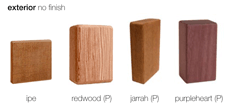
 |
 
Landscape Forms Continues to Destroy Rainforests
 Febraury 24, 2014 
According to a recent LF press release, LF considers itself “the industry leader in integrated collections of high-design site furniture…”. LF states that it has “sales representatives throughout North America, the United Kingdom, Southern Europe, the United Arab Emirates and Asia.” LF first entered RR’s radar screen when RR members found that the company had convinced staffers of the Santa Monica, CA municipal government to break their own law and purchase LF’s rainforest-wood-containing site furnishings. The problem with this was two-fold: first, Santa Monica’s law banned the purchase of rainforest woods by the city. But LF had argued that somehow, their FSC Chain-of-Custody certification status should afford them an exemption from the law. Staffers within the administration fell for this and went ahead and purchased benches from LF — breaking the city’s own law. Second, the wood in the furniture sold to Santa Monica was not from a certified logging operation. As have many other companies, LF had duped the administration by using it’s Forest Stewardship Council (FSC) chain-of-custody (CoC) certificate to convince them that the wood was certified (and thus, “sustainable”). But indeed, an FSC CoC certificate is given to a company to show that they are able to sell certified wood and keep it separate from non-ceritified, thus maintaining the certified wood’s “chain” as such. In reality, a CoC certificate in no way means that the wood in question is actually from a certified operation. For that, the wood must carry a Forest Management certificate number from the original producer. Too many have fallen for this ruse — and too many companies have perpetrated it, to the on-going (and unaddressed) shame of the FSC. Further, even if the wood were from a certified operation, just because wood is certified by an entity accredited by the Forest Stewardship Council (FSC), does not mean that the wood was logged sustainably. Indeed, FSC-certification is, by definition, given to operations that are deemed “well managed” by the certifier, according to FSC’s guidelines. As scientific studies have shown, when it comes to certifications in old-growth rainforests, this definition of “well managed” is not sustainable. Not only that, but in all cases that we have investigated, FSC’s own Principles and Criteria are not adhered in these certifications. We showed Santa Monica staff how they had been misled and also reminded them that the law on the books did not allow for the purchase of any rainforest wood — and thus they had broken their own law. To our knowledge, Santa Monica has not purchased any more rainforest wood. Just this month (Feb. 5, 2014), LF announced the introduction of it’s MultipliCITY line, available using ipê, purpleheart or jarrah. The line is designed by Yves Béhar, founder of fuse project, a San Francisco-based design agency. According to LF’s website, “Béhar brings a humanistic approach to his work with the goal of creating projects that are deeply in-tune with the needs of a sustainable future, connected with human emotions and which enable self-expression.” Apparently, Béhar has overlooked the impact of logging old-growth rainforest woods on a “sustainable future”, as has LF and many of the company’s other design partners. 
Old-growth woods available for Landscape Forms site furniture According to its press release, “Landscape Forms has an installed base of products around the world. Clients include municipalities, transit centers, corporate, college and health care campuses; and familiar brand leaders such as Boeing, Cisco Systems, Disney, Sprint, American Airlines, Herman Miller and Nike.” With this reach, LF has a responsibility to live up to its sustainability rhetoric and truly lead the industry in that direction. To add insult to injury, Landscape Forms touts their concern for the environment with all sorts of “sustainability” language. On the “Sustainability Data Sheet“ provided with the Melville Bench — offered in ipê, jarrah, purpleheart and redwood, the company states, “Landscape Forms has a special relationship to the natural environment. We have always been mindful that as we design and manufacture products that are acted upon by the environment, we act upon it in turn. Environmental sustainability is completely consistent with our purpose, our goals, our values and our principles. We make stewardship of the environment a vital part of our business.“ Yet LF only provides FSC-certified wood as “an option” for this bench. Instead of offering only second-growth woods, LF points out that the wood used on the bench is “100% recyclable.” As well, they use what they state is “biodegradable” plastic for the packaging. In light of the damage done to rainforests to log the trees to produce the wood for LF’s benches, recyclable packaging just isn’t going to cut it. Landscape Forms and their design partners must commit to end all sales of wood logged from old-growth rainforests. Send a message to LF demanding that they end their use of wood from old-growth rainforests. |
 |
 |
|||||||||||||||||
 Copyright 2013 Rainforest Relief |
||||||||||||||||||||
